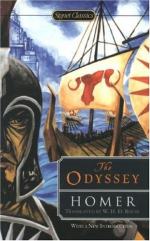’"Out of the smoke I laid them by, since they were no longer like those that Odysseus left behind him of old when he went to Troy, but they are wholly marred: so mightily hath passed upon them the vapour of fire. Moreover Cronion hath put into my heart this other and greater care, that perchance, when ye are heated with wine, ye set a quarrel between you and wound one the other and thereby shame the feast and the wooing; for iron of itself draws a man thereto.” But for us twain alone leave two swords and two spears and two shields of oxhide to grasp, that we may rush upon the arms and seize them; and then shall Pallas Athene and Zeus the counsellor enchant the wooers to their ruin. Yet another thing will I tell thee, and do thou ponder it in thy heart. If in very truth thou art my son and of our blood, then let no man hear that Odysseus is come home; neither let Laertes know it, nor the swineherd nor any of the household nor Penelope herself, but let me and thee alone discover the intent of the women. Yea, and we would moreover make trial of certain of the men among the thralls, and learn who {*} of them chances to honour us and to fear us heartily, and who regards us not at all and holds even thee in no esteem, so noble a man as thou art.’
{* Reading [Greek]}
Then his renowned son answered him, and said: ’O my father, of a truth thou shalt learn, methinks, even hereafter what spirit I am of, for no whit doth folly possess me. But I deem not that this device of thine will be gainful to us twain, so I bid thee to give heed. For thou shalt be long time on thy road to little purpose, making trial of each man, while thou visitest the farm lands; but at ease in thy halls the wooers devour thy goods with insolence, and now there is no sparing. Howbeit I would have thee take knowledge of the women, who they be that dishonour thee, and who are guiltless. But of the men I would not that we should make trial in the steadings, but that we should see to this task afterwards, if indeed thou knowest some sign from Zeus, lord of the aegis.’
Thus they spake one to the other. And now the well-builded ship was being brought to land at Ithaca, the ship that bare Telemachus from Pylos with all his company. When they were now come within the deep harbour, the men drew up the black ship on the shore, while squires, haughty of heart, bare away their weapons, and straightway carried the glorious gifts to the house of Clytius. Anon they sent forward a herald to the house of Odysseus to bear the tidings to prudent Penelope, namely, how Telemachus was in the field, and had bidden the ship sail to the city, lest the noble queen should be afraid, and let the round tears fall. So these two met, the herald and the goodly swineherd, come on the same errand to tell all to the lady. Now when they were got to the house of the divine king, the herald spake out among all the handmaids saying:
‘Verily, O queen, thy son hath come out of Pylos.’




